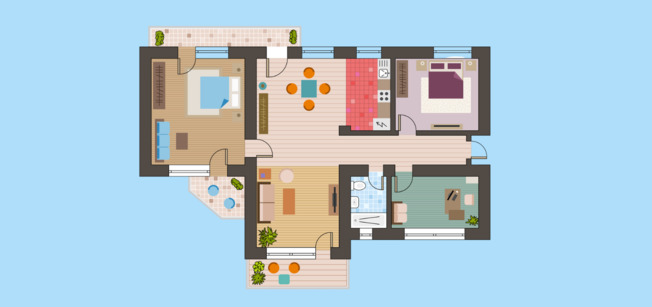
Moving-Out Checklist: What to Do & When to Do It
There’s more to the moving process than packing. Aside from making sure you have enough moving boxes, bubble wrap, and packing tape, there are many other details you must attend to—that’s where a moving-out checklist comes in handy. This article outlines what to do, when to do it, and other moving essentials to minimize stress when relocating to a new address.
When to Start Planning for Your Move
There are no hard and fast rules regarding when to start planning for your move. Basically, once you’ve made the decision to move to a new home or new apartment, it makes sense to start planning sooner rather than later. To avoid any last-minute scrambling and give yourself enough time, we suggest you start the moving process at least eight to ten weeks ahead of your move-out date.
Two Months Out
Get Organized
When it comes to relocating, there are a lot of moving parts (pun intended). Now is the time to set up an organization system—whether it be in an old-fashioned binder or a digital folder on your computer—for items like:
-
Moving company contract and details
-
Final bills for your utilities and other moving-related expenditures
-
Contact information for your new landlord, utility companies if you need to switch to a new provider, and other services you need
Research Moving Companies
If you haven’t already nailed down which moving company you’d like to use, ask around and research online to find reputable movers in your area. Note that moving companies can book up quickly, especially at certain times of the year, so as soon as you know your moving date, you may as well get started on this step.
If you’re a DIY type looking to skip the professional movers and would rather rent your own moving truck or van than hire movers, you’ll still need to book the truck in advance. Look at what’s available in your area, where you can return the rental in your new location, pricing, and other moving expenses. For example, do they provide moving blankets or furniture dollies?
Take Inventory
The best way to determine what to pack and when you should pack it is by taking inventory of what you have in each room. This inventory also helps you determine how many boxes, packing paper, and other packing items you’ll need. You should start by decluttering your space to get a clear understanding of what you have, especially if it is your first time moving.
As you move from room to room throughout your apartment, you’ll also be able to figure out what you can throw away, sell, and donate. Attending these tasks in advance means less packing (and unpacking) later on. You can sell items online, give things to family members, have a garage sale, donate items to charity, recycle items, and so on.
Start Packing
It might seem like you have all the time in the world, but now is when you should stock up on packing supplies and get started. Even if it’s just one box a day, you’ll thank yourself as your move-out date approaches. You do not want to find out that you don’t have enough moving supplies the day of the move-out. Start by packing items you rarely use. Examples of what to pack first include:
-
Off-season clothing such as your winter jacket if you’re moving during the summer
-
Unused kitchen items such as that set of dishes you only use for special occasions or casserole dishes you only use for large gatherings
-
Extra linens, towels, and curtains you can do without for a while
-
Non-essential decorative items such as pictures, photo albums, and framed art
Be sure to take the time to clearly label each box as you pack — trust us, it will make unpacking much easier.
Four Weeks Out
Submit Your Lease Termination
Tenants are required to submit a lease termination notice at least thirty days before their moving date. Be sure to contact your landlord or property manager in writing to let them know about your intent to vacate. While a verbal conversation in person or on the phone with your landlord is also recommended to confirm your lease termination, giving your notice in writing provides proof that you've complied with the terms of your rental agreement.
Contact Your Service Providers
Most service providers also require at least thirty days notice to terminate your services at your current location and set up services at your new one.
Cancel Your Renter’s Insurance
If you have renter’s insurance, now is the time to contact your insurance company to notify them that you’d like to cancel your current policy to coincide with your moving date. Now is also the time to get the ball rolling on a policy for your new apartment or home.
Re-stock Your Packing Supplies
Even though you started packing (you did, right?), you might still need additional packing supplies, such as tape, markers, boxes, bubble wrap, packing paper, and other items.
Remember, there are plenty of places to pick up free boxes if you want to stay within your moving budget. There are cardboard dump bins behind most retail locations, including liquor stores, grocery stores, restaurants, and other places where freight is regularly brought in. You can also ask your grocer if you can have their banana boxes and any others they want to get rid of.
Two Weeks Out
Change Your Address
The United States Postal Service makes it easy to change your address online. Simply enter your personal info and address details and select the date you’d like them to begin forwarding your mail to your new address. Although the initial forwarding period is six months and can be extended up to one year, we recommend changing your address while it is top of mind as soon as you move with any services providers that you haven’t already contacted (for example, your auto insurance company and cell phone provider). Otherwise any magazine or package subscriptions may continue to be delivered to your previous address.
Confirm It Again
Even though you’ve already contacted the moving company and utility providers to schedule your move and set up or transfer your services, it’s a good idea to confirm. Contact the moving company and, if they haven’t sent you details regarding what you can expect on moving day, ask them to email that to you. Be sure to contact your service providers to verify that everything will disconnect and reconnect as planned.
Finish Packing Everything But the Essentials
During these last two weeks, finish packing. Mark which boxes are fragile and take pictures of your valuables before packing them away. Be sure to keep like items together and label boxes accordingly — that way, when boxes come off the truck, they can be brought directly to the appropriate rooms, a big plus when it comes to unpacking.
At this point, you should pack everything but vital documents and daily-use essentials such as toiletries, medications, toilet paper, and everyday clothing items.
One Week Out
Repair Any Minor Damages in the Apartment
Consult your lease agreement to see what you’re required to repair. For example, you may need to remove all picture hangers from the walls and fill any nail holes with spackle.
Clean Your Place Top to Bottom
Complete a thorough cleaning of every room in the apartment, including scrubbing out kitchen and bathroom cabinets, unplugging clogged bath drains, cleaning appliances, wiping countertops, sweeping, vacuuming, and mopping. You can also look for important documents as it is not uncommon to find your long lost driver’s license or credit card at this time.
Schedule a Walkthrough
Reach out to your landlord to schedule a time to do a walkthrough of the apartment with you on your moving day. Ask them to bring the checklist from the initial walkthrough when you moved in to use as a basis for comparison during this move-out inspection.
Provide Your New Contact Details
Make sure you give your landlord or property manager your new address so they know where to send your security deposit if they don’t give it to you on your moving day.
One Day Out
Pack Any Final Items
Finally! Put the last essential items like chargers and paper towels into a tote, suitcase, or other storage bin for easy access during the move and when unpacking.
Moving Day
It probably felt like you’d never get here, but your moving day has arrived after all this hard work. During this past week, you’ve taken care of much of the details for your move, but there are still some last-minute things to do:
-
Empty Remaining Items from Refrigerator
-
Remove All Trash
-
Conduct a Final Walkthrough with Your Landlord or Property Manager
-
Request Your Security Deposit from Your Landlord
-
Return Your Keys to Your Landlord
-
Pick Up Keys from Your New Landlord
Final Thoughts
Every move (and renter) is different. For example, if you have pets, you may need to board them during the move. If you’re making a long-distance move to a different state, you’ll need to figure out how to transport your vehicle if you’re flying. You’ll also need to cancel any local memberships you’ll no longer be using, such as a gym membership. One easy thing to forget is transferring your medication to a new pharmacy. Wherever you're relocating, one thing is certain, a moving-out checklist is sure to help.
Top cities
Atlanta Apartments
1,999 apartments starting at $600/month
Austin Apartments
4,949 apartments starting at $600/month
Baltimore Apartments
1,472 apartments starting at $500/month
Boston Apartments
3,499 apartments starting at $940/month
Charlotte Apartments
2,903 apartments starting at $450/month
Chicago Apartments
4,012 apartments starting at $450/month
Dallas Apartments
5,609 apartments starting at $604/month
Fort Worth Apartments
2,193 apartments starting at $600/month
Houston Apartments
4,504 apartments starting at $590/month
Las Vegas Apartments
1,081 apartments starting at $704/month
Los Angeles Apartments
11,535 apartments starting at $625/month
Miami Apartments
544 apartments starting at $1,000/month
Milwaukee Apartments
928 apartments starting at $465/month
New York Apartments
4,118 apartments starting at $488/month
Oakland Apartments
608 apartments starting at $885/month
Orlando Apartments
842 apartments starting at $825/month
Philadelphia Apartments
3,657 apartments starting at $550/month
Phoenix Apartments
4,153 apartments starting at $599/month
Pittsburgh Apartments
1,223 apartments starting at $600/month
Portland Apartments
2,519 apartments starting at $599/month
Raleigh Apartments
1,367 apartments starting at $750/month
San Antonio Apartments
3,925 apartments starting at $525/month
San Diego Apartments
2,960 apartments starting at $650/month
San Francisco Apartments
436 apartments starting at $675/month
San Jose Apartments
405 apartments starting at $1,300/month
Seattle Apartments
3,623 apartments starting at $450/month
Tampa Apartments
1,078 apartments starting at $800/month
Washington DC Apartments
2,878 apartments starting at $745/month


